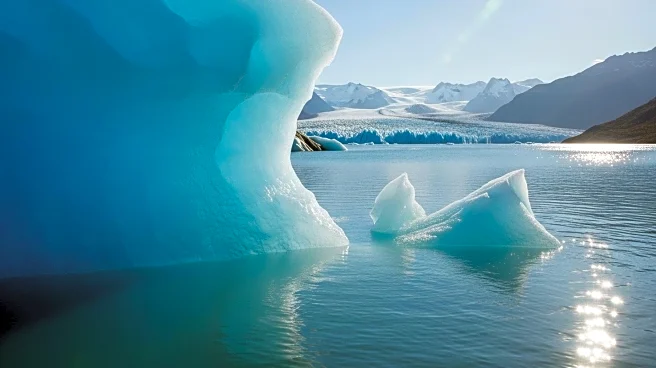What is the story about?
What's Happening?
Glaciers around the world are retreating at an unprecedented rate due to global warming, with significant implications for water resources. According to recent reports, glaciers outside the major ice sheets of Greenland and Antarctica lost 450 billion tonnes of ice in 2024 alone. This rapid melting is attributed to the increase in global temperatures caused by human activities, particularly the burning of fossil fuels. In Switzerland, glaciers have lost a quarter of their ice in the last decade, with some smaller glaciers disappearing entirely. The loss of glaciers is not only a visual change but also affects water availability for irrigation, drinking, and hydropower, especially in regions like the high mountains of Asia, known as the Third Pole.
Why It's Important?
The retreat of glaciers poses a significant threat to communities that rely on meltwater for their water supply. Approximately 800 million people, particularly in Asia, depend on glacier meltwater for agriculture and daily use. The loss of glaciers could lead to water shortages, affecting food production and energy generation. Additionally, the extra water from melting glaciers contributes to rising sea levels, posing a risk to coastal populations worldwide. The situation underscores the urgent need for global efforts to limit warming to 1.5C above pre-industrial levels to preserve half of the remaining glacier ice and mitigate these impacts.
What's Next?
If current trends continue, global temperatures are projected to rise by 2.7C above pre-industrial levels by the end of the century, leading to the loss of three-quarters of glacier ice. This scenario would exacerbate water scarcity and increase sea levels, affecting millions of people. Efforts to decarbonize and reduce carbon emissions are crucial to slowing glacier retreat and preserving water resources. Scientists emphasize that while the situation is dire, there is still an opportunity to mitigate the impacts through concerted global action.
Beyond the Headlines
The retreat of glaciers also has cultural and historical implications, as these natural formations have been part of human folklore and history for centuries. The loss of glaciers is a stark reminder of the broader impacts of climate change on natural landscapes and ecosystems. It highlights the interconnectedness of environmental changes and human activities, emphasizing the need for sustainable practices to protect the planet's resources for future generations.

















